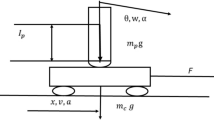Abstract
The ultimate objective of any control strategy is to maximize productivity, and improve the quantity of products and reduce costs. The performance of a bioprocess operating in fed batch production of protein can be obtained in two steps. First, we determine the optimal trajectories (profiles) for the variables of interests and then a genetic algorithm based on a fuzzy logic controller is applied to regulate these variables around these profiles.
An optimal feeding profile of a fed batch process based on an evolutionary algorithm is designed. This algorithm is well suited to derive multi-objective optimization, since it involves a set of non-dominated solutions distributed along the Pareto front. Several evolutionary multi-objective optimization algorithms have been developed in which the Non-dominated Sorting Genetic Algorithm NSGA-II is recognized to be very effective to overcome a variety of problems; an optimal control problem, usually solved by several methods considering single-objective dynamic optimization, is worked out.
Similar content being viewed by others
References
Banga, J.R., Alonso, A.A., Singh, R.P.: Stochastic dynamic optimization of batch and semicontinuous bioprocesses. Biotechnol. Prog. 13, 326–335 (1997)
Brans, J.P., Mareschal, B.: The PROMCALC and GAIA decision support system for multicriteria decision aid. Decis. Support Syst. 12, 297–310 (1994)
Bhaskar, V., Gupta, S.K., Ray, A.K.: Applications of multiobjective optimization in chemical engineering. Rev. Chem. Eng. 16(1), 1–54 (2000)
Bryson, A.E., Ho, Y.C.: Applied Optimal Control. Hemisphere, New York (1975)
Carrasco, E.F., Banga, J.R.: A hybrid method for the optimal control of chemical processes. IEE Conf. Publ. Inst. Electr. Eng. 455(2), 925–930 (1998)
Deb, K.: Multi-Objective Optimization Using Evolutionary Algorithms. Wiley, New York (2001)
Deb, K., Agrawal, S., Amrit, P., Meyarivan, T.: A fast and elitist multi-objective genetic algorithm: NSGA-II. IEEE Trans. Evol. Comput. 6, 182–197 (2002)
Dimopoulos, C.: Multi-objective optimization of manufacturing cell design. Int. J. Prod. Res. 44, 4855–4875 (2006)
Fonseca, C., Fleming, P.: An overview of evolutionary algorithms in multiobjective optimization. Evol. Comput. 3, 1–18 (1995)
Horn, J., Nafpliotis, N., Goldberg, D.E.: A niched Pareto genetic algorithm for multiobjective optimization. In: Proceedings of the First IEEE Conference on Evolutionary Computation, IEEE World Congress on Computational Intelligence, Piscataway, NJ, vol. 1, pp. 82–87 (1994)
Hong, J.: Optimal substrate feeding policy for a fed batch fermentation with substrate and product inhibition kinetics. Biotechnol. Bioeng. 28, 1421–1431 (1986)
Lee, J., Ramirez, W.F.: Optimal fed-batch control of induced foreign protein produced by recombinant bacteria. AIChE J. 40, 899–907 (1994)
Ranganath, M., Renganathan, S., Srinivasa Rao, Ch.: Genetic algorithm based fuzzy logic control of a fed-batch fermentor. Bioprocess Eng. 21, 215–218 (1999)
San, K.Y., Stephanopoulos, G.: A note on the optimality criteria for maximum biomass production in a fed-batch fermentor. Biotechnol. Bioeng. 26, 1261–1264 (1984)
San, K.Y., Stephanopoulos, G.: Optimization of a fed-batch penicillin fermentation: a case of singular optimal control with state constraints. Biotechnol. Bioeng. 34, 72–78 (1989)
Sarkar, D., Modak, J.M.: Pareto-optimal solutions for multi-objective optimization of fed-batch bioreactors using nondominated sorting genetic algorithm. Chem. Eng. Sci. 60, 481–492 (2005)
Schaffer, J.: Multiple objective optimization with vector evaluated genetic algorithms. In: Genetic Algorithms and Their Applications, Proceedings of the First International Conference on Genetic Algorithms, Pittsburgh, PA, pp. 93–100 (1985)
Shioya, S.: Optimization and control in fed-batch bioreactors. Adv. Biochem. Eng. Biotechnol. 46, 111–142 (1992)
Srinivas, N., Deb, K.: Multiobjective optimization using nondominated sorting in genetic algorithms. Evol. Comput. 2(3), 221–248 (1994)
Tholudur, A., Ramirez, W.F.: Obtaining smoother singular arc policies using a modified iterative dynamic programming algorithm. Int. J. Control 68(5), 1115–1128 (1997)
Wemmerlov, U., Johnson, D.J.: Empirical findings in manufacturing cell design. Int. J. Prod. Res. 38, 481–507 (2000)
Wang, F.S., Chiou, J.P.: Optimal control and optimal time location problems of differential-algebraic systems by differential evolution. Ind. Eng. Chem. Res. 36(11), 5348–5357 (1997)
Veldhuizen, D.A.V., Lamont, G.B.: Multiobjective evolutionary algorithms: analyzing the state-of-the-art. Evol. Comput. 8(2), 125–147 (2000)
Zitzler, E., Thiele, L.: Multiobjective evolutionary algorithms: a comparative case study and the strength Pareto approach. IEEE Trans. Evol. Comput. 3, 257–271 (1999)
Zitzler, E., Laummans, M., Thiele, L.: SPEA2: improving the strength Pareto evolutionary algorithm. TIK Report No. 103, Swiss Federal Institute of Technology (ETH), Computer Engineering and Networks Laboratory (TIK) (2001)
Author information
Authors and Affiliations
Corresponding author
Rights and permissions
About this article
Cite this article
Mokeddem, D., Khellaf, A. Optimal feeding profile for a fuzzy logic controller in a bioreactors using genetic algorithm. Nonlinear Dyn 67, 2835–2845 (2012). https://doi.org/10.1007/s11071-011-0192-2
Received:
Accepted:
Published:
Issue Date:
DOI: https://doi.org/10.1007/s11071-011-0192-2




